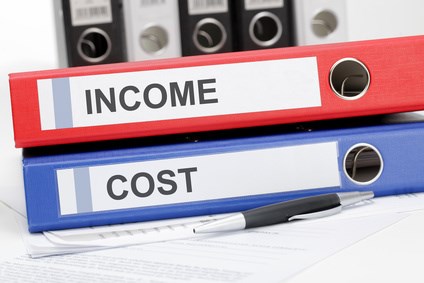Some people who are in business have no idea what it costs to run their business on a monthly basis. As a business owner you need to make sure you have enough profit in your business to cover your costs and leave enough for the lifestyle you aspire to. You need to have an understanding of your business costs in relation to your income and keeping your accounts up to date on a regular basis will enable you to keep track of income and outgoings.
Every business has fixed costs. At a minimum these will be telephone, insurance and software but possibly also rent, rates, and company vehicle running costs. These fixed costs have to be paid however much your income is so you need to know how much income you need each month to cover these fixed costs. Your own income is not classed as a fixed cost (unless you are a limited company and are paid through the payroll) so if your income only just covers your outgoings you will not be left with any earnings for yourself.
You need to add up your costs to know how much income you need to generate. The costs will include:
- Monthly overheads (telephone, insurance, etc)
- Plus costs necessary to create your sale(goods or any aspect related to the service you provide)
- Plus the income you would like to take
- Plus an amount for your potential tax bill
This will give you a break-even figure. You will need to have an income greater than this to create a profit to re-invest in your business if you want more or new software, to change your vehicle, to buy additional tools, have more earnings, etc.
If your income is not sufficient to cover the elements listed above then you need to consider increasing your prices but you need to be realistic about what you can charge your customers. There is no point calculating what profit you need to give you the income you want if the cost is too high in your industry for your customer to pay.
If you can't increase your prices you need to reduce your costs or reduce your earning expectations particularly in the early stages of your business. Employing someone else may help you achieve more income by increasing the amount of work you can do but this will, of course increase your costs.
The VAT threshold has just increased to £90,000 from £85,000 which will enable small businesses to increase their prices a bit and remain below the threshold. However costs are increasing and prices to customers need to increase as well to enable you to keep your profit margin so you could still reach the VAT threshold. Becoming VAT registered will not affect your customers if they are VAT registered businesses as they can claim back the VAT but if your customers are domestic, being VAT registered will mean you need to charge them an additional 20% which they may not like. However everyone has to pay VAT when they buy goods online or in a shop - its just part of life - so you need to decide whether your business can continue to grow and be VAT registered, or stay small and limit your income.
Businesses who understand what they need to earn each day, week or month to cover their costs can better manage their business and their lifestyle.
Each business must work out whether it is financially viable for them to work less days during the week, whether having an employee means better profit despite the additional cost or whether increasing income pushes you into being VAT registered which may not be beneficial for your business.
Keeping your accounts accurate and up to date will enable you to make informed decisions about your business and a bookkeeper will help you with this. Your bookkeeper should be able to tell you costs of running your business and will work through various scenarios with you to ensure you are achieving what you need to achieve.

